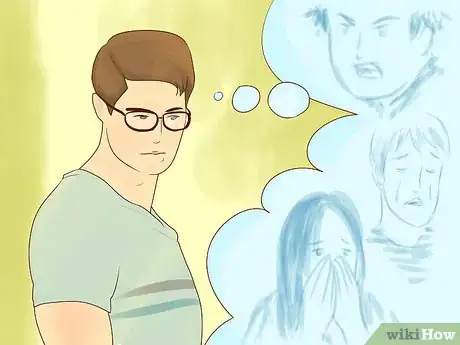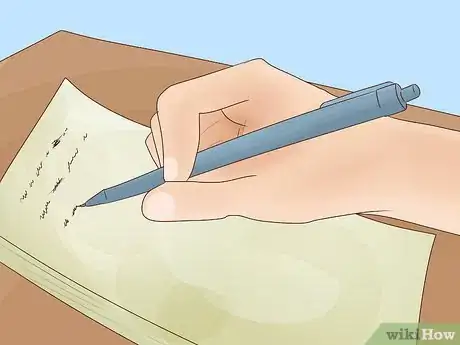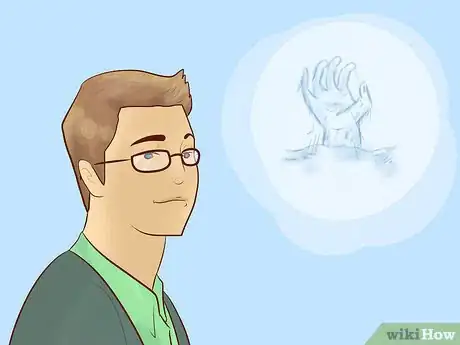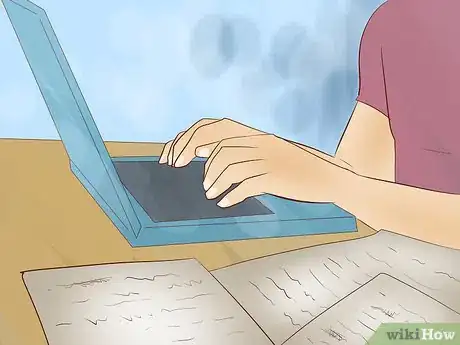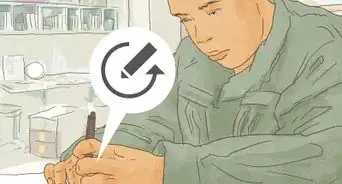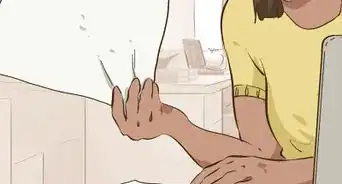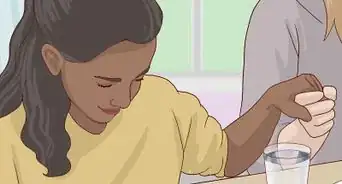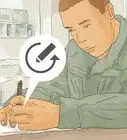This article was co-authored by Lydia Stevens. Lydia Stevens is the author of the Hellfire Series and the Ginger Davenport Escapades. She is a Developmental Editor and Writing Coach through her company "Creative Content Critiquing and Consulting." She also co-hosts a writing podcast on the craft of writing called "The REDink Writers." With over ten years of experience, she specializes in writing fantasy fiction, paranormal fiction, memoirs, and inspirational novels. Lydia holds a BA and MA in Creative Writing and English from Southern New Hampshire University.
This article has been viewed 90,395 times.
Maybe your book is not how you want it to be. Your hero might even be getting bored! Perhaps you just want to add tragedy and despair to your story, or add a bit of surprise to throw your readers off track. It could add a dramatic plot twist to your story. Killing a character is a good way to kill two birds with one stone. Believe it or not, but dramatically killing off a character improves your novel because it shows the effect that death has on everyone.
Steps
-
1Decide who you want to kill off. It sounds simple, but there can be multiple heroes. Maybe you want to kill off the secondary character, or kill the villain but then have the hero die unexpectedly. Multiple deaths can add unpredictability, all though don't over do it. Also, a secondary character death can add just as much emotion without completely uprooting the plot - it could create grief and stress for the hero or major characters. However, readers can empathize with the hero during a secondary character death, but they do some grieving themselves when a hero dies. Even a mystery death, where your hero disappears. You don't want to kill a character that nobody likes. You want to invoke emotion, and that's easier to do when your readers like the character that dies, it's the sad truth. However, killing off a major plot contribution (like a villain) may result in your heroes' success, goal, and could, possibly, end the story, so be careful with your choice.[1]
-
2Decide what emotions you want your reader to feel. Do you want the scene(s) to be humorous? Tragic? Heartbreaking? Surprising? Heroic? Romantic? Scary? You'll need to take this into account when you write the scene so that the voice and tone of the novel matches what you want the scene to be. Remember that you have to think of the effect it will have not only on the reader, the other characters, but also on the novel. It would be pointless to kill the main character's sister if they only ever spoke once, and had no effect on the current situation.[2]Advertisement
-
3Figure out the circumstances behind their death. Do they sacrifice themselves for the greater good or for a friend or lover? Does a side-kick die and save the hero? Are they dying of a terminal illness and commit suicide? Do they just commit suicide because of a mental illness? Does the villain callously murder them? Are they killed by accident, or by mistake? Are they going insane? Are they 'infected' and another mercy-kills them? Do they give up and die quietly, or fight to the end? Does the hero know that they are risking their lives? Are they in a dangerous situation to begin with, or does the death come out of nowhere? Will someone come back to life? This can also affect how readers will perceive the death scene (ie. a suicide would be sad, but a vicious murder could make the readers angry at the killer). Again, remember the effect you want, and where the death will lead your novel. But keep in mind it should make sense to the plot, also, don't make your character die in a way that is not like them. If a character is very emotionally stable, suicide is a bad option.
-
4Outline a rough sketch of their death. Start with a relatively ordinary setting, explain what happens, build dramatically, and boom! That person dies. Add an outline of the aftermath and take note if any other plot developments bloom.
-
5Before you really start putting time into this, make sure that you have your mind made up. The death of a character changes the plot throughout the rest of the book and it mixes it up. It's great for the thrill factor, but killing off a character might make it more difficult to write so make sure you are certain before you kill off the character. Also make sure you don't need that character in any of the future scenes.
-
6Once you start writing, try to use some foreshadowing in the story. Don't make the imminent death obvious, but you might want to drop some clues.[3]
-
7Emphasize the aftermath. You can really play off of the readers' emotions, specifically if you're going for raw emotions such as grief and tragedy. Write about all of the characters' reactions, even the minor ones. You can add a lot of characterization. Remember you don't have to have each character react massively straight away. Perhaps one of the characters seem not to be effected by the persons death but later on has a break down.You could also change a way in their behavior and schedule.[4]
-
8If you are going to add a moral, let the readers figure it out. Don't have a character say something like, "Well, I guess the moral is that we should be more careful with Kryptonite next time." One way this can be done is with the use of symbolism-- just don't make it blatantly obvious!
-
9Continue the story: How do the other characters recover? Do they recover at all? Do other deaths result from this one - suicide, or a villain taking advantage of the shocked community? Maybe a huge other plot development will occur - Was the sacrifice for nothing? Could the death have been avoided? Is the death anyone's fault? Do they feel guilty? This can also just be the opinion of one character.
-
10Remember: Not everybody stays dead! If your story is a fantasy, perhaps they are reincarnated, or communicate through their soul, or even come back to life as a mythological being. Maybe someone travels back in time to prevent it. Perhaps it was all a mistake and they weren't really dead! (Be careful with that one, it can become cliched, and can be very over-written). Sometimes its better not to overuse these because it can make the readers feel cheated. Another thing to consider is, if you plan on bringing someone back into the story from the dead, is that characters death truly needed? While the death of a character has great effect, an un-needed death could actually ruin the novel.[5]
-
11Now go out there write the story and have fun killing a loved character. Happy Writing!
- If you want to write more compelling descriptions of people or their characters, watch people.
- You can sit at a park or some public place like a cafe and observe people.
- Or you can watch TV and see how characters are depicted on the screen.
Community Q&A
-
QuestionHow do you kill off a character I really like? In my story, he is a father figure.
 Community AnswerThe father-figure could die in the line of duty (in the case of any fighting genres), maybe from a terminal disease, or simply from an accident. Identify what role he plays in the larger plot, then his role to the character. Is he a good guy, or a bad one? How will his death motivate the character and further the plot? The fact that you're even considering killing a character you like makes you a good writer (in my opinion). If you read the Harry Potter series, you'll find some good examples of the death you may want.
Community AnswerThe father-figure could die in the line of duty (in the case of any fighting genres), maybe from a terminal disease, or simply from an accident. Identify what role he plays in the larger plot, then his role to the character. Is he a good guy, or a bad one? How will his death motivate the character and further the plot? The fact that you're even considering killing a character you like makes you a good writer (in my opinion). If you read the Harry Potter series, you'll find some good examples of the death you may want. -
QuestionWhen it comes to the death scene, how do I actually go about killing my character off?
 Community AnswerThere could be a murder, a suicide, or whatever you want. Just don't make it ridiculous or out of place.
Community AnswerThere could be a murder, a suicide, or whatever you want. Just don't make it ridiculous or out of place. -
QuestionWhat about if you have already killed off a character?
 Community AnswerIf you've already killed them off, find a way to describe their death later in the story. Maybe someone is reading a police report or newspaper clipping about it.
Community AnswerIf you've already killed them off, find a way to describe their death later in the story. Maybe someone is reading a police report or newspaper clipping about it.
Warnings
- Readers might get mad, so make sure that you plan out everything and make sure that this is what you want to do!⧼thumbs_response⧽
- When killing off a character, remember that this means that this character will be gone forever. Trying to 'bring back the person from the dead' makes the author sound desperate.⧼thumbs_response⧽
- Don't plagiarize! There are serious ethical and legal effects. It's okay to privately re-write the ending of your favorite book series, but its not okay to publish a novel that is almost identical to another. If you are using somebody's character, always get through to the person first to seek permission.⧼thumbs_response⧽
- You can have the hero kill the person (character) that the character cares for the most. In a way that twists the plot to intrigue the audience making it feel like a irony. For example, you can have the villain be the child the hero has long been searching for and only the character that knew withheld it from the hero pretending to be one of his most trusted friend or a victim because he/ she had been harboring hated or a hidden agenda. Now, the plot gets interesting with a new threat, confessions, revelations, mystery, and suspense.⧼thumbs_response⧽
Things You'll Need
- Paper
- Pencils
- A computer
- A friend or family member that you are comfortable sharing your work with
References
- ↑ https://www.helpingwritersbecomeauthors.com/kill-a-character/
- ↑ https://www.theringer.com/tv/2018/8/2/17636990/character-deaths-tv-rains-of-castamere
- ↑ https://springhole.net/writing/killing-main-characters.htm
- ↑ https://springhole.net/writing/killing-main-characters.htm
- ↑ https://springhole.net/writing/how-to-bring-a-character-back-to-life.htm

